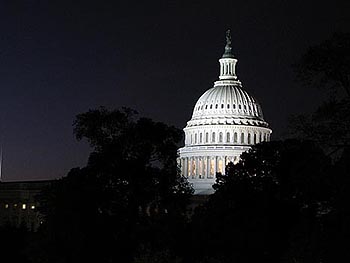If congressional Republicans refuse to raise the debt ceiling, does this mean the United States will default? Brit Hume says no. Bob Somerby wonders if he’s right:
Is is true? is our use of the term “default” just a bit of scare talk?….Millions of people are being told that we won’t go into true “default” if the debt limit stays where it is—and millions more have no idea what the term “default” means.
This is something that’s the object of some slippery language lately. If the debt ceiling isn’t raised, then government spending will be limited to the amount that it brings in via tax receipts. Give or take a bit, this amounts to $200 billion per month. The president will have  to decide how to spend this money, and everyone agrees that his first priority has to be interest payments to bondholders, which comes to only about $20 billion per month. In other words, there’s no chance at all that the United States will go into default in the usual financial meaning of the word.
to decide how to spend this money, and everyone agrees that his first priority has to be interest payments to bondholders, which comes to only about $20 billion per month. In other words, there’s no chance at all that the United States will go into default in the usual financial meaning of the word.
However, if, like Paul Krugman, you talk about the United States “defaulting on many of its obligations,” you’re using the word in a more everyday sense. The federal budget allocates money for various purposes, and there are lots of people who are counting on getting that money. But if spending is limited to $200 billion per month, some of them won’t.
So: we won’t default on bond payments, but we will “default” on some portion of federal spending that’s already been authorized.
Krugman calls the Republican debt ceiling threat “vile.” If we hit the debt ceiling, he says, “This would have disastrous effects on financial markets, the economy, and our standing in the world. Yet Republicans are threatening to trigger this disaster unless they get spending cuts that they weren’t able to enact through normal, Constitutional means. Republicans go wild at this analogy, but it’s unavoidable. This is exactly like someone walking into a crowded room, announcing that he has a bomb strapped to his chest, and threatening to set that bomb off unless his demands are met.”
Is this right? I’d say so. If Republicans want to play hardball on budget cutting, they have a perfectly normal, well-accepted way of doing that: during the budget process. If they don’t get their way on spending, they can refuse to pass a budget. This would require the president to start shutting down government programs, which is exactly what he’ll have to do if the debt limit isn’t raised.
So why is one vile while the other is merely reckless? That’s simple: In the case of a budget showdown, Republicans would be refusing to authorize new spending. But in the case of the debt ceiling, Republicans would be explicitly refusing to pay bills they’ve already run up. This is the action of a banana republic, not the most powerful nation on earth, one whose reliability and good word is crucial to the orderly workings of global financial markets.
It’s one thing to disagree about which programs should be funded and the level of that funding. That’s ordinary politics. Shutting down the government over that disagreement may be reckless, hardball politics, but that’s all it is. But refusing to pay bills for goods and services you’ve already purchased? Refusing to pay out money to individuals and businesses who you’ve previously promised to pay and who are counting on those payments because, after all, whose word is better than the United States government? That’s a whole different thing. And that’s vile.

















